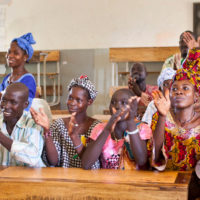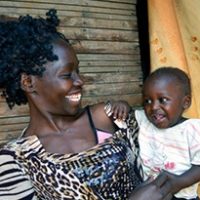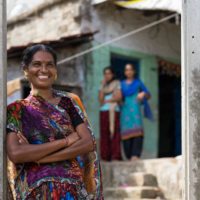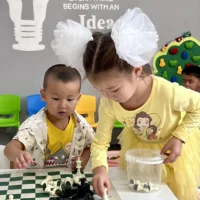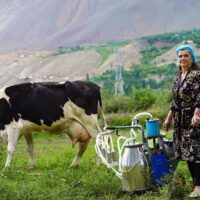Goal 8: Promote sustained, inclusive and sustainable economic growth and decent work for all.
In Gujarat, India the Aga Khan Rural Support Programme (AKRSP) provides young people opportunities to explore a variety of livelihoods beyond traditional agriculture through its Yuva Junction program, which began in 2007. (See an earlier post here.) In this post, Shiji Abraham, a program officer for AKRSP India, reflects on the past decade of this project. Her story provides a snapshot of our work toward Goal #8 in the Sustainable Development Goals: Decent Work and Economic Growth. The project is working toward that goal, providing young people with skills and motivation for employment in growing sectors.
“With the money from her job, Vahida’s family renovated their thatched house. That made her father as proud of her as if Vahida were a son. That may sound strange, but she tells me this with tears in her eyes..”
The number of people the Indian government and its partners are hoping to provide job skills training to by 2022.
are providing training, mobilization and job placement services to youth.
Have benefitted from courses and programming offered by these centers.
Building Brighter Futures
May 5th, 2017 started as a hot summer morning but an exciting one. As the day began, I witnessed enthusiasm among old and young alike, parents and young people flocking into the Gadu campus of AKRSP in Gujarat. They were celebrating the one-year anniversary and new employment by the graduates of the Yuva Junction livelihoods training program. Most of the young people and their parents had come to collect trophies for completing a year in their new positions.
The young workers got an early start to make sure they get to campus on time, some 60 miles from their homes. Now that they have arrived, the happiness is on their parents’ faces. The young people gathered at the Gadu campus have shown a “Never say die” spirit to reach this moment. It was also a proud moment for us at AKRSP, as we completed 10 glorious years of Yuva Junction taking new paths to find openings for a young workforce in alternative livelihoods.
Vahida’s Rising Quality of Life
Vahida is one of those enthusiastic participants. Vahida came here with her brother from a remote village of Ramrechi. A childhood bout with polio damaged her legs but not her indomitable spirit. For this ceremony, she took leave from her job in Rajkot, over an hour away, to celebrate. Her family is disadvantaged: her father owns no land and the family survives on the income from his job as a laborer, around Rs. 50,000 (about US$785) a year.
Being physically challenged but good in academics, Vahida entered our program with her family’s support, and they helped her reach graduation. Every day she traveled to the campus for her course in Retail Sales. The program helped her get a job with D-Mart in Ahmedabad at a good salary, and through hard work she earned a promotion to cashier. Now she works as a supervisor with Reliance Trends in Rajkot with an annual salary of over $2,000. She sends over half her monthly salary home to her family, and sets aside about $63 to support herself, including a small portion she saves for her wedding expenses.
With the money from her job, Vahida’s family renovated their thatched house. That made her father as proud of her as if Vahida were a son. That may sound strange, but she tells me this with tears in her eyes. These ten years of Yuva Junction’s work have touched many lives like hers, and their families. Vahida’s success deepens our commitment to continue our efforts.
Livelihoods for Rural India
India stands at the forefront of a “demographic dividend” and economic growth that comes with a changing population. The country must capitalize on its young workforce by developing a skilled human resource base. Skill India is a campaign that was launched by Prime Minister Narendra Modi in July 2015. The initiative aims to train over 400 million people in job skills by 2022.
Aligned with that government mission, Yuva Junction provides an opportunity for young people between the ages of 18 to 30 years to explore livelihoods beyond agriculture. Yuva Junction focuses on remote, rural pockets of Gujarat and Bihar. These regions are where household incomes have relied on farming and where they most need to diversify their income sources.
Holistic Approach for Growing Youth Skills
Yuva Junction began in 2007 with an initiative called “Computerji… jode Duniya se.” The initiative aimed to bridge the urban/rural divide by making technology accessible to rural youth through computer training. The program also provided information on careers. The program evolved and in 2012 adopted the goals of “Inform, Educate and Employ.” True to that tagline, the initiative empowers rural youth by providing them information about government programs, jobs, career opportunities, and educates them to help them get jobs.
Yuva Junction has seen a change from a supply-based approach to a market-oriented approach for jobs. The curricular trainings now occur for positions such as Retail Sales Associate, Domestic BPO, Computer Hardware Technician, and Accounts Assistant. These include trainings on cross-cutting skills in Computers, Life Skills, Spoken English and Work Place Readiness. Assistant Beauty Therapist and Bed Side Patient Assistant courses have been added to provide more options for women. This market-based approach to training has helped rural youth bridge the urban/rural divide. Courses on repairing, sewing and stitching alongside entrepreneurship training also help to open opportunities for enterprise development.
Since 2007, this initiative has enjoyed support from its corporate sponsors like Microsoft. In 2012, a partnership with Quest Alliance added a blended learning approach where learners and facilitators connected through a combination of high-quality digital tools.
This structured approach for bringing skill-based training to rural areas helped AKRSP to garner government support in Gujarat from the Ministry of Rural Development. All trainings emphasize sustainable employment and document job retention and career progression.
Adapting to Unfamiliar Settings
AKRSP recognizes that many trainees are first-time urban migrants and hence face challenges related to migration for work. To help them cope with the cultural shifts in new settings, Yuva Junction has a special focus on placement retention. Besides career training, graduates receive access to many services like exposure visits, pre-placement talks and parents meetings. Yuva Junction also set up a Migration Support Center in Ahmedabad to help young women with transition issues. The program mobilizes the whole community and works with parents and alumni to create an ecosystem that enables young people to succeed in their new careers.
Currently, AKRSP has 13 Yuva Junction centers – 11 in Gujarat and 2 in Bihar – and plans to scale up trainings in new areas. Fifty enthusiastic professionals manage these centers. They support training, mobilization and placement. It has trained 3,058 youths on various job-oriented courses and has helped 1,815 youths find meaningful employment; a few of them have started their own enterprises. Graduates now work with leading service providers like Vodafone, Airtel and retail outlets like Big Bazaar, Café Coffee Day, Domino’s, and KFC. The average graduate salary is around $118 per month. In addition, the program has trained approximately 25,000 in computer skills which has indirectly helped them get job promotions.
Yuva Junction celebrated this milestone by honoring 150 young people who, like Vahida, dared to dream and fulfill their potential. In doing so, they have explored the world beyond the horizon, bringing smiles and hope into their communities.
Our work is not yet done. Yuva Junction plans to continue to help young people in this part of India achieve their dreams and find new jobs. We aim to provide over 5,100 young people with job skills in the next three years. It’s a small but important part of the movement to create a world where everyone enjoys decent work and economic growth.
A SUSTAINABLE VISION FOR A BETTER WORLD
The Sustainable Development Goals (SDGs), sometimes called the Global Goals, are a worldwide movement to break the cycle of poverty and ensure all people can fulfill their potential. For fifty years, the Aga Khan Foundation, as a part of the Aga Khan Development Network, has been working to do that. We are thrilled to share these stories from around the Network that show how we are building brighter futures, in line with our partners dedicated to ending poverty through the SDGs. We work together with communities, partners, and supporters like you to achieve the 17 goals that will improve quality of life for everyone. We invite you to enjoy and share these stories of what we can accomplish together.
